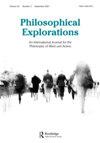Adverbialism, the many-property problem, and inference: reply to Grzankowski
IF 1.1
3区 哲学
0 PHILOSOPHY
引用次数: 0
Abstract
ABSTRACT A serious problem for adverbialism about intentionality is the many-property problem, one major aspect of which is the claim that natural inferences between thought contents are blocked if adverbialism is true. Kriegel (2007. “Intentional Inexistence and Phenomenal Intentionality.” Philosophical Perspectives 21: 307–340. doi: 10.1111/j.1520-8583.2007.00129.x., 2008. “The Dispensability of (Merely) Intentional Objects.” Philosophical Studies 141: 79–95. doi: 10.1007/s11098-008-9264-7., 2011. The Sources of Intentionality. New York: Oxford UP) argues that the determinable-determinate relation can be pressed into service by adverbialists to respond to this problem. Grzankowski (2018. “The determinable-determinate relation can’t save adverbialism.” Analysis 78: 45–52. doi: 10.1093/analys/anx068) argues that this doesn’t work because when applied to intentional properties absurd results follow and thus the victory is pyrrhic. In this paper, I examine how we must understand the inferences at the heart of the many-property problem if we are to avoid attributing unwanted assumptions to adverbialists. With this understanding in place, there is a reply to Grzankowski on behalf of the adverbialist that holds that the determinable-determinate relation can be used as one tool among others for assessing the thought content of others. So, Grzankowski’s objection to Kriegel can be met. In the end, however, this entire dialectic is a dead end because it treats the ascriptions of intentional states as fused adverbs forming compound adverbial modifiers, and these fused adverbs lack compositionality and are syntactically simple. As such, interpreters cannot decompose the linguistic content of adverbialist ascriptions, which is nearly always a necessary step in assessing the thought content of others. So, the determinable-determinate reply actually fails because we do need these ascriptions to be subject to compositionality. In the end, adverbialists must opt for a structural approach to the many-property problem, as recently seen in the work of Banick (2021. “How to be an adverbialist about phenomenal intentionality.” Synthese 198: 661–686. doi: 10.1007/s11229-018-02053-0) and D'Ambrosio (2021. “The many-property problem is your problem, too.” Philosophical Studies 178: 811–832. doi:10.1007/s11098-020-01459-2).状语、多属性问题与推理:回复Grzankowski
意向性状语论的一个严重问题是多属性问题,其一个主要方面是如果状语论为真,思想内容之间的自然推理就会受阻。Kriegel(2007。"意向性不存在和现象性意向性"哲学观点21:307-340。doi: 10.1111 / j.1520-8583.2007.00129.x。, 2008年。"(仅仅)意向性客体的可有可无"哲学研究141:79-95。doi: 10.1007 / s11098 - 008 - 9264 - 7。, 2011年。意向性的来源。纽约:牛津大学(Oxford UP)认为,可决定的-决定的关系可以被状语用来回应这个问题。Grzankowski(2018。"定-定关系不能挽救状语"分析78:45-52。Doi: 10.1093/ analyys /anx068)认为这不起作用,因为当应用于有意属性时,会出现荒谬的结果,因此胜利是得不宜失的。在本文中,我研究了如果我们要避免将不必要的假设归因于状语,我们必须如何理解多属性问题的核心推论。有了这样的理解,就有一个对格赞科夫斯基的回答,代表状语的人认为,决定性-决定性关系可以作为评估他人思想内容的工具之一。因此,格赞科夫斯基对克里格尔的反对意见可以得到满足。然而,这整个辩证法最终是一个死胡同,因为它将意向状态的归属视为构成复合状语修饰语的融合副词,这些融合副词缺乏组合性,句法简单。因此,口译者无法分解状语归属的语言内容,而这几乎总是评估他人思想内容的必要步骤。所以,决定性-决定性的回答实际上是失败的,因为我们确实需要这些归属服从于组合性。最后,状语必须选择一种结构性的方法来解决多属性问题,正如Banick(2021)最近的工作所看到的那样。"如何成为现象意向性的状语"合成198:661-686。doi: 10.1007/s11229-018-02053-0)和D'Ambrosio (2021. doi: 10.1007/s11229-018-02053-0)。“房产多的问题也是你的问题。”哲学研究178:811-832。doi: 10.1007 / s11098 - 020 - 01459 - 2)。
本文章由计算机程序翻译,如有差异,请以英文原文为准。
求助全文
约1分钟内获得全文
求助全文

 求助内容:
求助内容: 应助结果提醒方式:
应助结果提醒方式:


